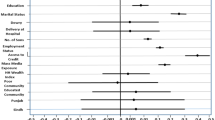Abstract
Education should be taken on priority because it is the most significant factor for the development of the rural environment. Education is the basis for foresightedness and creativity that triggers changes; it helps in the quality of human resource, quality of life and economic growth. Education takes us away from overpopulation and misery to enlighten, poverty, darkness and tradition backwardness. In the development of society, women in Pakistan has been playing a predominant role through their active participation in social as well as economic activates directly or indirectly. The present study investigates the association among education and empowerment of rural women in Pakistan by using primary data, which were collected from rural areas of Southern Punjab by using multi-stage cluster sampling. The result of the study reveals that the main determinants of women empowerment are education, socioeconomic condition of females compares to region or cost. The results also show clearly that structure of family has a relationship with the status of women as well as the participation of women in the decision-making.
Similar content being viewed by others
References
Agnes, F.: Economic rights of women in Islamic law. Economic and Political Weekly, pp. 2832–2838 (1996)
Akhter, R., Ward, K.B.: Globalization and gender equality: a critical analysis of women’s empowerment in the global economy. Adv. Gender Res. 13, 141–173 (2009)
Al-Dajani, H.: Women’s empowerment: a comparison between non-profit and for-profit approaches in empowering home-based women producers. Unpublished Ph.D. thesis, University of Strathclyde, Glasgow (2007)
Bruce, J.: Families in Focus: New Perspectives on Mothers, Fathers, and Children. The Population Council, One Dag Hammarskjold Plaza, New York (1995)
Carpenter, R.C.: “Women, children and other vulnerable groups”: gender, strategic frames and the protection of civilians as a transnational issue. Int. Stud. Quart. 49(2), 295–334 (2005)
Elson.: United Nations Division for the Advancement of Women (DAW) Expert Group Meeting. Empowerment of women throughout the life cycle as a transformative strategy for poverty eradication 26–29 November, New Delhi, India (1999)
Falkenbach, D., Poythress, N., Falki, M., Manchak, S.: Reliability and validity of two self-report measures of psychopathy. Assessment 14(4), 341–350 (2007)
Faridi, M.Z., Basit, A.B.: How do workers decide to work? Evidence from district Bahawalpur. Pak. J. Soc. Sci. (PJSS) 30(2), 193–208 (2010)
Garikipati, S.: The impact of lending to women on household vulnerability and women’s empowerment: evidence from India. World Dev. 36(12), 2620–2642 (2008)
GlenMaye, L.: Empowerment of women. In: Gutierrez, L., Parsons, R., Cox, E.O. (eds.) Empowerment in Social Work Practice: A Sourcebook. Brooks/Cole, Pacific Grove, pp. 29–47 (1998)
Granovetter, M.: Economic action and social structure: the problem of embeddedness. Am. J. Sociol. 91(3), 481–510 (1985)
Gratz, J., Nation, S.O., Schools, S.O., Kurth-Schai, R.: The impact of parents’ background on their children’s education. Educ. Stud. 268, 1–12 (2006)
Jabre, B., Underwood, C., Goodsmith, L.: Arab women speak out: profit less of self-empowerment. John Hopkins Centre for Communication Programmes and Centre of Arab Women’s Training and Research, Baltimore (1997)
Kabeer, N., Mahmud, S., Tasneem, S.: Does Paid Work Provide a Pathway to Women’s Empowerment? Empirical Findings from Bangladesh (2011)
Katungi, E., Edmeades, S., Smale, M.: Gender, social capital and information exchange in rural Uganda. J. Int. Dev. 20(1), 35–52 (2008)
Khan, T., Mahtab, N., Haq, M.A.U.: Gender disparity in economic returns to higher education: evidence from private formal sector of Bahawalpur (Pakistan). Interdiscip Rev Econ Manag 2(1) (2012)
Khan, T., Rehman, H., Haq, M.A.U.: Determinants of rural household poverty: the role of household socioeconomic empowerment. Am.-Eur. J. Agric. Environ. Sci. 15(1), 93–98 (2015)
Kontos, M.: Considerations on the biographical embeddedness of ethnic entrepreneurship. In: Biographical Methods and Professional Practice: An International Perspective, pp. 57–72 (2004)
Krejcie, R.V., Morgan, D.W.: Determining sample size for research activities. Educ. Psychol. Meas. (1970)
Madasu, S.: Public Service Commission Preparation. Retrieved May 19, 2016 (2013), from http://pscpreparation1.blogspot.my/2013/01/the-role-of-education-in-empowerment-of_2.html
Malhotra, A., Schuler, S.R.: Women’s empowerment as a variable in international development. In: Measuring Empowerment: Cross-Disciplinary Perspectives, pp. 71–88 (2005)
Mason, K.O., Smith, H.L.: Women’s empowerment and social context: results from five Asian countries. In: Gender and Development Group, World Bank, Washington (2003)
Mehra, R.: Charity and empowerment. Ann. Am. Acad. Polit. Soc. Sci. 554, 136–149 (1997)
Mosedale, S.: Assessing women’s empowerment: towards a conceptual framework. J. Int. Dev. 17(2), 243–257 (2005)
Narayan-Parker, D., Patel, R.: Voices of the Poor: Can Anyone Hear Us?, vol. 1. World Bank Publications (2000)
Nwanesi, P.K.: Development, Micro-Credit and Women’s Empowerment: A Case Study of Market and Rural Women in Southern Nigeria (2006)
Sardenberg, C.M.: Women’s empowerment in Brazil: tensions in discourse and practice. Development 53(2), 232–238 (2010)
Shahid, M.A.: Human Rights (Pakistan Studies). Higher Education Commission, Islamabad (2004)
Shami, M.A.: Political Empowerment of Women in Pakistan. University of the Punjab Press, Lahore (2001)
Sharma, U. Women Empowerment through Information Technology. Authorpress (2003)
Sholkamy, H.: Power, politics, and development in the Arab context: or how can rearing chicks change patriarchy? Development 53(2), 254–258 (2010)
Wieringa, S.: Women’s interests and empowerment: gender planning reconsidered. Dev. Change 25(4), 829–848 (1994)
United Nations.: Rural Women Face Problems Of Discrimination And Manifold Disadvantages|Meetings Coverage and Press Releases. Retrieved May 23, 2016, from http://www.un.org/press/en/2007/gashc3887.doc.htm (2007)
Author information
Authors and Affiliations
Corresponding author
Rights and permissions
About this article
Cite this article
Abrar-ul-haq, M., Jali, M.R.M. & Islam, G.M.N. Empowering rural women in Pakistan: empirical evidence from Southern Punjab. Qual Quant 51, 1777–1787 (2017). https://doi.org/10.1007/s11135-016-0365-7
Published:
Issue Date:
DOI: https://doi.org/10.1007/s11135-016-0365-7




